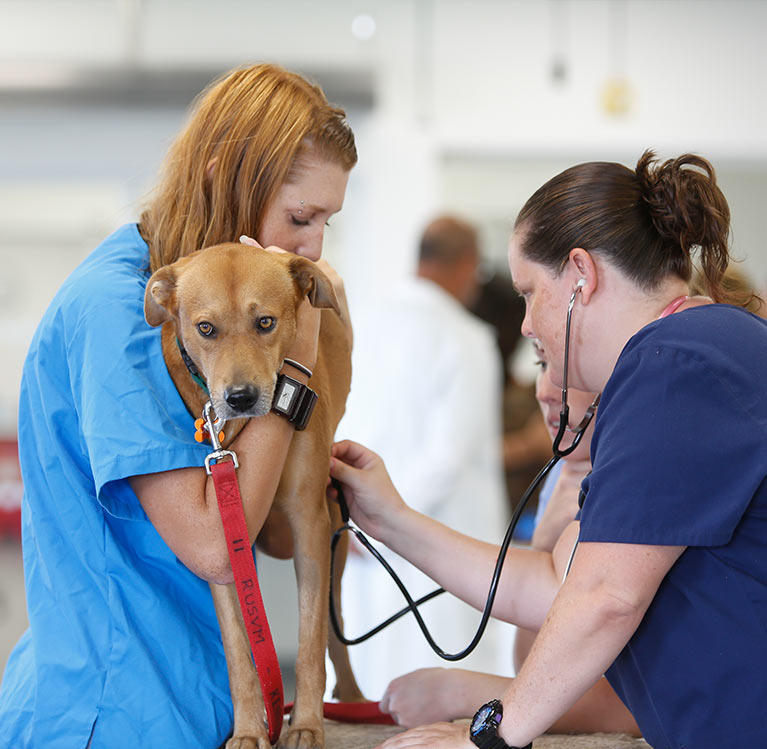Vaccination Standards From Your Relied On Veterinarian
Inoculation standards provided by your relied on veterinarian play an important duty in safeguarding your animal's wellness and well-being. Additionally, attending to usual mistaken beliefs bordering vaccines can additionally improve pet proprietors' confidence in these preventive steps.

Relevance of Vaccinations
Inoculations play an essential duty in safeguarding pets versus a variety of preventable diseases. By promoting the body immune system to acknowledge and battle particular virus, vaccines substantially reduce the incidence of infectious conditions that can impact a family pet's health and wellness and long life. Not just do vaccinations safeguard private animals, but they additionally add to herd resistance, therefore reducing the general frequency of diseases in the animal population.
Timely inoculations aid to alleviate the spread of conditions such as rabies, parvovirus, and distemper, which can have serious repercussions for both human beings and pets. Moreover, vaccinations are commonly a requirement for boarding facilities, grooming solutions, and pet dog parks, making them vital for those that wish to socialize their family pets.
Core Vaccines for Pet Dogs
While the details vaccination demands of animals can vary based upon individual factors, core injections are generally advised to protect against the most usual and severe diseases (Veterinarian Enterprise). Core vaccines are those considered vital for all animals, no matter their way of life or geographic location, as they protect against potentially fatal and highly transmittable diseases
For pet dogs, the core injections include those for canine distemper, parvovirus, adenovirus (liver disease), and rabies. Adenovirus can result in liver illness, while rabies is a zoonotic disease that poses a risk to both animals and people.
In pet cats, core vaccines include feline panleukopenia, feline calicivirus, feline herpesvirus (rhinotracheitis), and rabies. Feline panleukopenia is a highly contagious viral disease that impacts the immune system and intestinal tracts. Calicivirus and herpesvirus are major contributors to upper breathing infections in felines, while rabies remains a crucial problem for public wellness.
Talk to your veterinarian to ensure your pets receive their core vaccinations on time.
Non-Core Vaccines Explained
Non-core vaccines are customized to deal with specific dangers connected with a pet dog's environment, way of living, and direct exposure to specific diseases. Unlike core injections, which are generally recommended for all family pets, non-core vaccinations are thought about based upon specific conditions. These vaccines are especially vital for family pets that may come across one-of-a-kind pathogens because of their geographical area, travel routines, or tasks.
Examples of non-core vaccinations consist of those for Bordetella bronchiseptica, which is linked to kennel coughing, and Lyme illness, caused by ticks. Family pets that frequently connect with other animals, such as those in boarding centers, pet parks, or brushing settings, may take advantage of Bordetella inoculation. If you live in an area where Lyme condition is widespread, immunizing against this disease can be a prudent choice for outdoor-loving canines.
Other non-core injections might consist of those for leptospirosis, canine influenza, and feline leukemia, depending on the details Continue threat aspects present. It is important to have a complete discussion with your veterinarian regarding your animal's way of living and the potential demand for these injections, making sure a tailored vaccination approach that best safeguards your hairy friend.
Vaccination Schedule Introduction
As pet dogs mature, it is necessary to abide by the recommended booster inoculations. Veterinarian Enterprise. For adult pets, core injections are commonly provided every one to 3 years, depending on the particular vaccination and neighborhood guidelines. Non-core vaccinations may be recommended based upon way of life variables and local disease occurrence, requiring a customized approach
Routine vet examinations are critical for updating inoculation schedules. Your vet can provide advice on one of the most suitable booster shots for your animal, factoring in age, health status, and environmental risks. By remaining proactive and notified, family pet proprietors can ensure her latest blog their hairy buddies receive timely and efficient vaccinations, thereby guarding their health and health throughout their lives.
Usual Misconceptions Concerning Injections
Misconceptions regarding animal inoculations can cause complication and hesitation among family pet proprietors pertaining to the booster shot process. One common misconception is that vaccines are unnecessary for indoor pets. While it holds true that interior pets deal with lower dangers, they are not totally immune to illness, as pathogens can be presented via numerous methods, including human clothes and other animals.
An additional false impression is that vaccines can create the diseases they aim to protect against. Actually, a lot of injections include suspended or attenuated pathogens, which can not create illness in healthy animals. Some pet dog owners likewise think that their pets should not be immunized if they are currently healthy; nevertheless, inoculations are an aggressive step that assists protect against the beginning of health problem.
Furthermore, many animal owners are afraid that injections will lead to lasting health and wellness complications. The advantages of inoculation-- shielding pet dogs from potentially dangerous conditions-- much outweigh the risks.
Final Thought
In recap, adherence to vaccination guidelines go is vital for making sure the health and wellness and longevity of pets. Eliminating common misconceptions surrounding inoculations even more reinforces the importance of informed decision-making in family pet treatment.
Not just do inoculations secure private pets, however they likewise add to herd immunity, consequently decreasing the general occurrence of illness in the animal population.
Misunderstandings about pet dog inoculations can lead to confusion and unwillingness among family pet proprietors concerning the immunization procedure. While it's real that indoor pet dogs encounter reduced dangers, they are not completely immune to conditions, as microorganisms can be presented via numerous ways, consisting of human garments and other pets.
Some pet dog owners additionally believe that their pet dogs should not be vaccinated if they are currently healthy; however, inoculations are a proactive measure that aids stop the beginning of disease.
The advantages of vaccination-- shielding family pets from possibly deadly illness-- much surpass the threats.